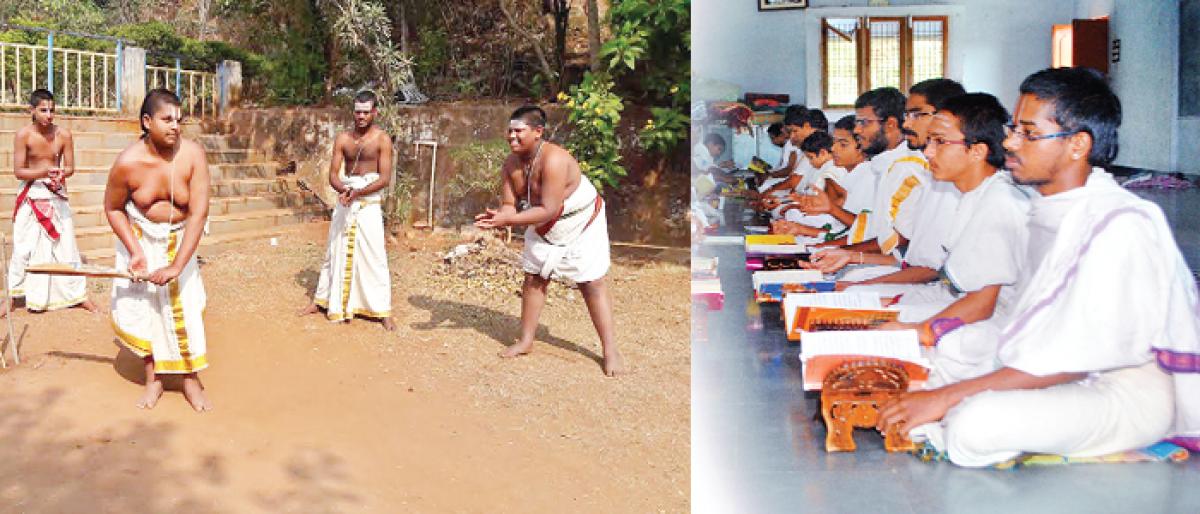Live
- CM Revanth Reddy Clarifies on Rs. 31,000 Crore Crop Loan Issue
- Kejriwal looking for ‘safe’ seat: Delhi Congress chief Devender Yadav
- Ram Gopal Varma gets temporary respite from Andhra HC in derogatory posts case
- AMRUT 2.0 scheme allocates Rs 66,750 crore to help cities become 'water secure'
- PM Modi to dedicate successful implementation of 3 new criminal laws in Chandigarh
- Punjab pitches for continuation of GST compensation beyond March 2026
- Shiroor Mutt Sets Stage for 2026 Paryaya with ‘Bale Muhurtha’ Ritual
- India a rising economic power & gateway for investments: Global leaders
- Rainbow Children's Hospital Celebrates 25 Years of Nurturing Smiles
- "Chilkur Balaji Priest Visits Sacred Jogulamba Temples, Performs Special Rituals".
Just In

The Rigveda is known as the earliest literature to survive. Even foreigners reportedly appreciated the Vedas. They are unwritten verses, which sages handed them to disciples through the Guru-Sishya Parampara. The Vedas are a repository of the knowledge.
The Rigveda is known as the earliest literature to survive. Even foreigners reportedly appreciated the Vedas. They are unwritten verses, which sages handed them to disciples through the Guru-Sishya Parampara. The Vedas are a repository of the knowledge.
Till “Dwapara Yuga”, it remained as a single entity until Sage Veda Vyasa divided it into four parts— Rigveda, Yajurveda, Samaveda and Atharvaveda. In modern days, there are many, who promoted the Vedas. There are youngsters, who want to learn the Vedas in spite of lure and lucre of English education, especially the engineering education.
Sri Alivelu Manga Charitable Trust is running a Vedic school and also a Smartha school, which is being run in Amba Choultry on the banks of river Godavari in the temple town of Bhadrachalam. Notwithstanding the onslaught of modern age, the youth are inclined to learn the Vedas to continue their family tradition. Their destination is the school being run by the Trust in Bhadrachalam. The eligibility condition for them to enrol in the school is that they should be of eight years of age.
Aspirants have to appear for an examination in government-recognised schools annually and complete one course after the other in their long academic career. The examinations are held at Guntur, Tirupati, Vijayawada and Rajahmundry in Andhra Pradesh and at Telangana Vidwat Parishad in Hyderabad. Further, the examinations are also held in Mysuru and Srungeri in Karnataka.
Students pursue Vedic education for 12 years to become Kramapaathi and 14 years to become Ghanapaathi. They also appear for the Sanskrit language test conducted by the Bhadradri Temple Devasthan-run Sanskrit school.
The students routine commences at 4am when they recapitulate lessons taught by their teachers. At 5.30am, they bathe and perform Sandhyavandanam and Agnikaryam. At 7am they go to the temple of Lord Sitaramachandraswamy and recite from the Vedas and recite Panchasuktam.
After having the breakfast at 8.30 am, they attend classes, which run until 12 noon. At 12.10 pm, they perform Sandhyavandana and have lunch at 12.40pm. They take rest until 2pm and attend afternoon session from 2pm to 4pm. They brush up their Sanskrit language skills from 4pm to 5pm.
For leisure, they play cricket, volleyball, chess, etc till 6pm. They recite the Stotras from 7pm to 8pm. They have their dinner at 8pm and post-dinner they refer to their lessons from 8.30pm to 10 pm. Before retiring for the day, they jot down in their diary what they have done all through the day.
They are prohibited from reciting the Vedas on Paadhyami and Ashtami days and also on the New Moon Day. In a month, Paadhyami and Ashtami occur twice and the New Moon Day once. On these days, instead of reciting the Vedas, they perform Agnikaryam and Gayatri Japam.
The trust is spending at least Rs 150 per day per student towards the cost of food. It provides each student three pairs of dresses and medical facility. Besides the Vedic education, the school being run by the Trust also conducts classes in Smartam (priesthood).
Those who are trained in the priesthood are eligible to perform Sanskaras like marriage and thread ceremony. Speaking to The Hans India, a Vedic scholar and a teacher at the school Devarabhotla Srinivasa Sarma, a Kramapaathi, says that he derives pleasure in teaching what he has learned. Vedic education is the key to safeguard the Hindu traditions. Learning the Vedas helps students gain command over other Sastras. The Vedas contain teachings that are beneficial to society.
A teacher in Smartam, Kommuru Sumantasai Manikumar Sarma, says that his father, a priest by profession, wanted him to continue in the same profession sharing the knowledge to others. “To fulfil my father’s objective, I have become a teacher. My younger brother Bharadwaj Sarma is also continuing in the same profession,” he avers.
A student of the Vedic course Damera Narasimhacharyulu said that learning Vedas has become a family tradition. He says there is science in the Vedas. The Vedas are the source of all learning. All knowledge is embedded in the Vedas.
A student of Smartam, Chodavarapu Sanjeeva Sarma, said that he is following in the footsteps of his father Subrahmanya Sarma. He successfully completed the first year and entered the second year. He enrolled in the school as he is very much interested in the Sanatana Sampradayam.

© 2024 Hyderabad Media House Limited/The Hans India. All rights reserved. Powered by hocalwire.com







